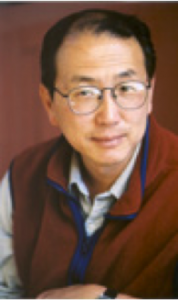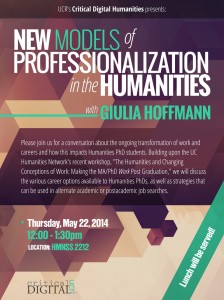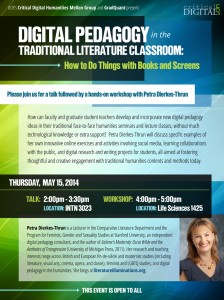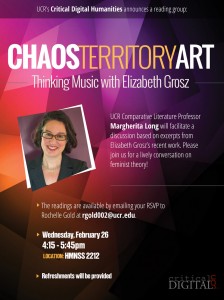Posts from the ‘uncategorized’ Category
“This is Not a Book: Long Forms of Attention in the Digital Age,” a talk by Dr. Alan Liu of the University of California, Santa Barbara

Tuesday June 3, 11:00am-12:30pm
UCR INTS 1113
A common response to an electronic book or other digital media is that, while it may be better or worse than a book, “this is not a book.” But digital media has the uncanny effect of making us realize that physical books themselves were never truly books–if by “book” we mean a long form of attention designed for the permanent, standard, and authoritative communication of human thought or experience. This talk will outline methods for discovering and tracking socially repeatable and valued “long forms of attention” whether in books or other constellations of materials, in the past or the digital present.
This talk will conclude with a look at the RoSE (Research-oriented Social Environment) created by a team at the University of California, Santa Barbara, directed by Liu.
This talk is co-sponsored by The Material Cultures of the Book Working Group
New Models of Professionalization in the Humanities with Giulia Hoffmann
May 4th, 2014
Rochelle Gold
Please join us for a talk and discussion at UC Riverside with Dr. Alan Liu of UCSB on Tuesday, June 3 from 11-12:30 pm in INTS 1113.
This is Not a Book: Long Forms of Attention in the Digital Age
A common response to an electronic book or other digital media is that, while it may be better or worse than a book, “this is not a book.” But digital media has the uncanny effect of making us realize that physical books themselves were never truly books–if by “book” we mean a long form of attention designed for the permanent, standard, and authoritative communication of human thought or experience. This talk outlines methods for discovering and tracking socially repeatable and valued “long forms of attention” whether in books or other constellations of materials, in the past or the digital present. The talk concludes with a look at the RoSE (Research-oriented Social Environment) created by a team at the University of California, Santa Barbara, directed by Liu.
Last week I attended the DHSoCal meeting hosted by UCSD with Sarah Lozier and Steve Anderson. The meeting was a gathering of over 30 faculty, graduate students, librarians, and alt-acs from universities and colleges across southern California. Perhaps the major takeaway was that people working in the digital humanities across Southern California are enthusiastic about increased opportunities for formal and informal collaboration and coordination across campuses!
Here are just a few key points from various large group conversations and smaller discussions throughout the day:
1. Cast a wide net. DHSoCal participants are working on a broad spectrum of issues, from archiving early modern literature to critically analyzing contemporary data visualizations, that might seem to have little in common at first glance. The digital humanities is a useful term in that it brings these disparate individuals together, even as it is also problematic because it potentially collapses differences. In light of critiques of the digital humanities by groups like Postcolonial Digital Humanities, the question of how to make the digital humanities more inclusive came up repeatedly, especially with regards to those working in languages other than English. There was also interest in expanding the boundaries of DHSoCal to include digital humanities scholars and practitioners in Mexico and throughout the Southwest.
2. Meet in person. While participants in this group regularly use Google Hangouts to coordinate and plan, all of those present expressed interest in having in-person get-togethers at least twice a year. One of the best parts of the meeting was the extended period for mingling and small group discussion where spontaneous convergences between individuals could occur.
3. Pool resources. There was a lot of discussion about how we might support one another and use one another’s expertise across campuses. This is absolutely vital, because there is so much to learn in the digital humanities and many of us agree that it is not necessary or even possible for any one person to be deeply knowledgeable about all things DH. Many participants were interested in using the DHSoCal website and the Twitter hashtag #DHSoCal as online spaces for connecting and sharing ideas. Furthermore, there was talk about potentially pooling resources to work towards SoCal based multi-campus DH grants.
4. Learn together. A major focus of the day was on how to bring digital humanities methods and theories into the undergraduate classroom and also how to teach ourselves what we need to do in order to use digital humanities tools in our teaching and research. In order to work on increasing opportunities for collaboration and learning, DHSoCal members plan to organize a THATCamp in San Diego next Fall. I so look forward to it!
Author: Sarah Lozier
As a humanities graduate student interested in looking at digital media, digital processes, and digital sociality, it is tempting to define myself professionally as a Digital Humanities scholar. But this definition isn’t particularly helpful, since it almost always elicits the response — “And what does that actually mean?” Indeed, being a DH professional seems to “mean” differently for different people, and these definitional slippages become increasingly problematic when it comes to those non-research necessities of being an aspiring academic (getting jobs, applying for grants, and teaching undergraduates). In an effort to think through some of these slippages and their politics, I’d like to look at one specific resource for DH professionalization — the University of Victoria’s Digital Humanities Summer Institute (DHSI) — to think about what this program suggests effective DH professionalization is and does.
The DHSI is “a week of intensive coursework, seminars, and lectures,” all focused around issues pertinent to the digital humanities. This year’s twenty-seven seminars cover a wide range of topics ranging from “Text Encoding Fundamentals” to “Electronic Literature in the Digital humanities,” but all twenty-seven are organized along a kind of divide between building digital skill sets — coding, software use, etc — and dealing with fairly traditional issues of humanities study applied to digital objects — “reading” electronic literature, applying “theory” to digital media, etc.
This divide strikes me as potentially indicative of the larger problem of professionalizing in DH, and that is the question of what a DH professional does. While these seminars cover topics dealing explicitly with navigating the Digital and topics dealing explicitly with navigating the Humanities, there aren’t any seminars that explicitly deal with digital AND humanities navigation, DH as one unit. They suggest that DH is still D and H, Digital and Humanities. The problem with this “and” is analogous to the problem of the hyphen conceived as the splice that Katherine Hayles discusses in the fifth chapter of How We Became Posthuman. That is, D (and) H imagines a “separate but equal” relationship between the items on either side of the and, even as it officially splices them together (DH) as one item. Scholars who do this thing called “DH” must actually do “D and H,” making the discipline a necessarily exclusive rather than inclusive one. In the hectic world of the modern academy, where tenure is disappearing and we are asked more often than not to work “for free,” today, being a DH professional is all but closed off to those who already have the time and resources to equivalently pursue D and H — established, funded academics. Until we can more effectively splice D and H into DH, this exclusivity and definitional slipperiness will continue to exist.
Review: “Media in the Archives: Libraries, Popular Culture, and the Digital” Panel Discussion
October 18th, 2013
Kimberly Hall
by Sarah Lozier
On October 17th, 2013 I had the opportunity to attend a panel discussion hosted by UCR’s History Department on the topic of Media in the Archives. In general, the panelists described various forms that archival work can take, whether one is working in an academically-supported research archives like the Huntington, a corporate pop-cultural exhibition-supported archived like that of NBCUniversal, or a digitized archive of material documents like the California Digital Newspaper Collection (CDNC). Given the range of archives presented, it is no surprise that there were many different strategies for navigating the challenges and perks of archival work. What was perhaps, more surprising, was that there were nearly as many similarities as differences presented, particularly among theoretical axes of authenticity and originality. Here, however, I’d like to focus on one archival issue in particular that did not get much attention, but that can be particularly provocative when material and digital cultures and archives collide—the issue of the User.
The User did enter the conversation yesterday when Brian Geiger described the invaluable role of the untrained, amateur user to correct errors in the text that occur in the digitization process due to the limits of computer-based text recognition. Dr. Geiger pointed out that allowing these amateur users this level of access to affect and change the archival material is a bittersweet affair. On the one hand, it frees up the trained, degree-holding archivists to spend time on work that requires the specialist’s hand; while at the same time potentially expediting the digitization process, and with fewer mistakes, due to an increased human labor force. (This introduces the problem never far from DH labor discussions of Crowd-Sourcing, but that is best saved for another post). On the other hand, the CNDC is still an institutionally accredited archive, and there are very real possibilities that this untrained labor force is introducing as many (if not more damaging) errors to the archival materials than the computer. Indeed, the untrained user could only get this kind of access to a digital archive; the very notion would be unthinkable for a material and physical archive like the Huntington or NBCUniversal’s Archives, where the “user” is either a trained researcher operating under the watchful eye of the archivist, or a spectator who is encouraged to Look-Don’t-Touch.
So who is the archive’s User? What does it mean to really use an archive? Can using be limited to accessing? Or can it be expanded to include interacting, as in the shift of replacing “reader” with “user” in conversations about e-Lit? What are the stakes and potential effects of this conceptual expansion, particularly given the slippery place of labor in accessing, using, and interacting? Are we, the institutionally-supported and access-granted DH scholars, the Privileged Users, willing to support this?
Response by Rochelle Gold
Every September, the new MLA Job Information List (JIL) offers a snapshot of the state of the field for literary scholars. Roopika Risam’s recent blog post “Where Have All the DH Jobs Gone?” points out that in spite of the hype around digital humanities as the next big thing, digital humanities job opportunities are dwindling. After reading through the JIL, Risam concludes that while a number of job postings, including 17 literature positions, call for digital humanities as a secondary area of expertise, very few postings seem to look for digital humanities as a primary research field. As a result, she argues that “the explicitly DH job is perhaps the most endangered species on the JIL.” To her credit, Risam specifies throughout her blog post that her results are necessarily tentative as job postings are continuously added to the MLA job list throughout the fall. Nonetheless, it is hard to fully understand to what extent Risam’s point about the digital humanities becoming “endangered” makes sense without more context of the humanities job market as a whole. We especially need to know how the number of digital humanities jobs compares to other subfields. I accessed the job list several weeks after Risam to see if her conclusions hold. As Risam herself points out, the JIL can be unwieldy as different search terms yield different results. I will give just a few partial yet suggestive examples. The search terms “Victorian” and “19th century” yielded nine and 11 results respectively. On the other hand, “digital media” and “digital humanities” generated 27 and 32 results. My unscientific tinkering on the JIL points to the extremely harsh realities of the job market overall. While the digital humanities job pool may be shrinking, this seems to reflect the broader trend of the disappearance of jobs in literature and the humanities. Comparatively, digital humanists are probably still faring a little better than the rest, but, of course, that is not saying much at all.
Read Risam’s original post here: http://roopikarisam.com/2013/09/15/where-have-all-the-dh-jobs-gone/




